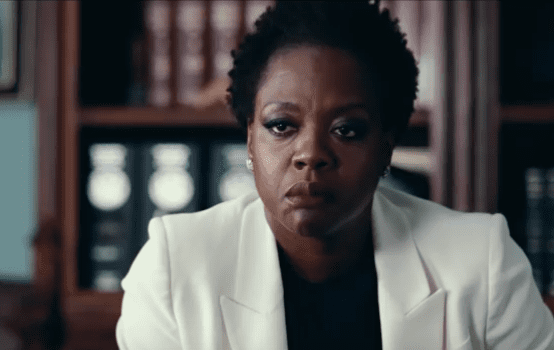Widows is a Dirge More Than a Caper

Editor’s Note: November 27 is #GivingTuesday, and we at TAC rely on the generosity of our readers. If you’d like to support our efforts to advance a more peaceful, humble, “Main Street” conservatism, please consider joining us by making a year-end gift here.
Judging by the quality of its constituent parts, it’d be hard to think of a more promising movie than Steve McQueen’s new crime drama Widows. On the acting front, there’s the steely Viola Davis in the lead, backed up by all-stars like Michelle Rodriguez, Elizabeth Debicki, Liam Neeson, and Colin Farrell. The script was co-written by McQueen and Gillian Flynn—she of the razor-edged thrillers Gone Girl, Sharp Objects, and Dark Places. And the premise is pure dynamite: a group of women, widowed after the deaths of their husbands in a heist gone wrong, step into their men’s shoes for one more job.
But alas, the brilliance of Widows’ components is utterly absent from the finished product. As a result, it may well be the most disappointing film I’ve seen all year.
As the film opens, Chicago South Side resident Veronica (Davis) mourns the loss of her husband Harry (Neeson) in a fiery shootout following a botched robbery. And her life promptly gets worse when Harry’s employer, Jamal Manning, demands that Veronica—who’s spent the last few years living a plush lifestyle, thanks to Harry’s successes—make good on Harry’s debts. Fortunately, it turns out Harry left behind a notebook containing plans for his next job, a $5 million smash-and-grab at a wealthy citizen’s home. And even more fortunately for Veronica, Harry’s partners’ widows (Rodriguez and Debicki) are game to join her. Their conspiracy unfolds against the backdrop of an election for a Chicago alderman seat between Manning and longtime politico Jack Mulligan (Farrell).
Following that promising opening, Widows deteriorates into a turgidly paced morass, more to be endured than enjoyed. I found myself particularly reminded of 2011’s Tinker Tailor Soldier Spy, which similarly lost its way in a tangle of irrelevant plot threads, overlong scenes, and seemingly disconnected character arcs. Put bluntly, nothing much happens during two-thirds of this movie—and there’s no good reason for this sluggishness. The climactic caper itself isn’t a particularly elaborate job, and it’s over almost before we know it.
Perhaps I should’ve better anticipated what I was in for: behind the camera, McQueen typically takes a slow-burning, deliberate approach to his scenes. We’re thrust deeply into the inner lives of his characters as his camera probes every nook and cranny of their features, exposing any hidden vulnerabilities. And to be sure, this technique can work very well. After all, it’s those very aching, lingering shots that make a bleak indie drama like McQueen’s Shame so unforgettable.
But it’s a style that clashes unpleasantly with Flynn’s jagged, twisty narrative instincts. Crafty plotting, not high art, is Flynn’s stock in trade—and that’s certainly the case here. Without spoiling anything, there’s a satisfying gut-punch of a reveal about halfway through the film, and I found myself thinking there’s the Flynn move. It recalls the brilliant perspective shift at the heart of Flynn’s last book, forcing the viewer to reinterpret everything they’ve seen.
Inexplicably, though, this twist just…fizzles out. Despite the initial shock of surprise, the development hardly affects the narrative at all. Things just drift back towards a dreary equilibrium as the plot marches forward, eventually culminating in a flaccid “payoff” moment devoid of any real tension. There’s a reason David Fincher, not McQueen, helmed 2014’s Gone Girl adaptation. (What’s more, the movie’s underlying stakes feel profoundly insignificant. Absent more context—which we’re never provided—an alderman’s seat feels like an awfully marginal prize to justify the degree of robbery and bloodshed we see onscreen.)
At bottom, Widows is a film that struggles to decide what it wants to be. Is it a straight-up crime thriller in the vein of Heat? It’s not taut enough for that. Is it a noir-inflected tale of corruption à la Chinatown or L.A. Confidential? It’s too meandering for that. Is it an empowerment fantasy? I’ll take Ocean’s 8, thank you very much. Is it a character study designed to give Davis the chance to shine? If so, it doesn’t give her much to work with—indeed, her character feels awfully similar to the one she played in Suicide Squad. Is it a political statement of some sort? If so, its point is opaque.
Perhaps Widows is most coherently read as an indictment of the damage done by careless men to the lives of the women around them. That interpretation, at least, is consonant with the onscreen evidence (and the rest of Flynn’s literary corpus). Here, a police shooting during a traffic stop claims the life of a major character’s son. Rodriguez’s character is ousted from her workplace by greedy men. Debicki’s character works as a high-priced escort to an increasingly demanding client. And, of course, the event that kicks everything off is the deaths of the widows’ husbands in the course of crime—an “abandonment” of sorts that drives the rest of the narrative forward.
But if this really is the kernel of the film, Widows provides a decidedly uninspiring counter-narrative. No one transcends their individual circumstances to find a better path forward. No one takes to the streets to decry the institutional corruption that permeates the proceedings here. We even lack the pulpy satisfaction of watching our protagonists commit crimes more expertly than their late husbands. This is not empowerment, or even a particularly stinging critique of the underlying forces at work: it’s just narrative drudgery all the way down.
I really wanted to like this film. And I certainly didn’t hate the elements that ultimately did make it to the screen. But there’s simply not much here in the first place—and that’s the real tragedy.
John Ehrett is executive editor of Conciliar Post and a graduate of Yale Law School.
Comments